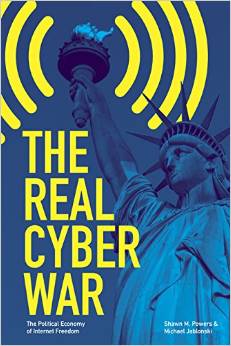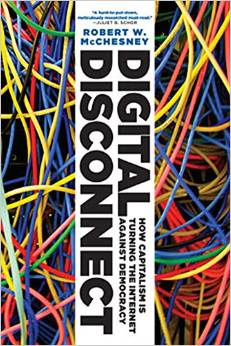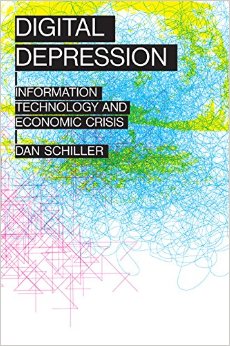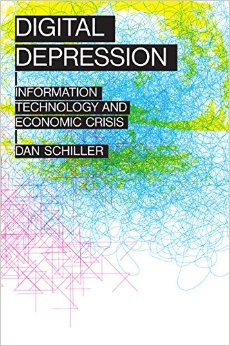a review of Bernard Harcourt, Exposed: Desire and Disobedience in the Digital Age (Harvard, 2015)
by Richard Hill
~
This is a seminal and important book, which should be studied carefully by anyone interested in the evolution of society in light of the pervasive impact of the Internet. In a nutshell, the book documents how and why the Internet turned from a means to improve our lives into what appears to be a frightening dystopia driven by the collection and exploitation of personal data, data that most of us willingly hand over with little or no care for the consequences. “In our digital frenzy to share snapshots and updates, to text and videochat with friends and lovers … we are exposing ourselves‒rendering ourselves virtually transparent to anyone with rudimentary technological capabilities” (page 13 of the hardcover edition).
The book meets its goals (25) of tracing the emergence of a new architecture of power relations; to document its effects on our lives; and to explore how to resist and disobey (but this last rather succinctly). As the author correctly says (28), metaphors matter, and we need to re-examine them closely, in particular the so-called free flow of data.
As the author cogently points out, quoting Media Studies scholar Siva Vaidhyanathan, we “assumed digitization would level the commercial playing field in wealthy economies and invite new competition into markets that had always had high barriers to entry.” We “imagined a rapid spread of education and critical thinking once we surmounted the millennium-old problems of information scarcity and maldistribution” (169).
“But the digital realm does not so much give us access to truth as it constitutes a new way for power to circulate throughout society” (22). “In our digital age, social media companies engage in surveillance, data brokers sell personal information, tech companies govern our expression of political views, and intelligence agencies free-ride off e-commerce. … corporations and governments [are enabled] to identify and cajole, to stimulate our consumption and shape our desires, to manipulate us politically, to watch, surveil, detect, predict, and, for some, punish. In the process, the traditional limits placed on the state and on governing are being eviscerated, as we turn more and more into marketized malleable subjects who, willingly or unwillingly, allow ourselves to be nudged, recommended, tracked, diagnosed, and predicted by a blurred amalgam of governmental and commercial initiative” (187).
“The collapse of the classic divide between the state and society, between the public and private sphere, is particular debilitating and disarming. The reason is that the boundaries of the state had always been imagined in order to limit them” (208). “What is emerging in the place of separate spheres [of government and private industry] is a single behemoth of a data market: a colossal market for personal data” (198). “Knots of statelike power: that is what we face. A tenticular amalgam of public and private institutions … Economy, society, and private life melt into a giant data market for everyone to trade, mine, analyze, and target” (215). “This is all the more troubling because the combinations we face today are so powerful” (210).
As a consequence, “Digital exposure is restructuring the self … The new digital age … is having profound effects on our analogue selves. … it is radically transforming our subjectivity‒even for those, perhaps even more, who believe they have nothing to fear” (232). “Mortification of the self, in our digital world, happens when subjects voluntarily cede their private attachments and their personal privacy, when they give up their protected personal space, cease monitoring their exposure on the Internet, let go of their personal data, and expose their intimate lives” (233).
As the book points out, quoting Software Freedom Law Center founder Eben Moglen, it is justifiable to ask whether “any form of democratic self-government, anywhere, is consistent with the kind of massive, pervasive, surveillance into which the United States government has led not only its people but the world” (254). “This is a different form of despotism, one that might take hold only in a democracy: one in which people loose the will to resist and surrender with broken spirit” (255).
The book opens with an unnumbered chapter that masterfully reminds us of the digital society we live in: a world in which both private companies and government intelligence services (also known as spies) read our e-mails and monitor our web browsing. Just think of “the telltale advertisements popping up on the ribbon of our search screen, reminding us of immediately past Google or Bing queries. We’ve received the betraying e-mails in our spam folders” (2). As the book says, quoting journalist Yasha Levine, social media has become “a massive surveillance operation that intercepts and analyses terabytes of data to build and update complex psychological profiles on hundreds of millions of people all over the world‒all of it in real time” (7). “At practically no cost, the government has complete access to people’s digital selves” (10).
We provide all this data willingly (13), because we have no choice and/or because we “wish to share our lives with loved ones and friends” (14). We crave digital connections and recognition and “Our digital cravings are matched only by the drive and ambition of those who are watching” (14). “Today, the drive to know everything, everywhere, at every moment is breathtaking” (15).
But “there remain a number of us who continue to resist. And there are many more who are ambivalent about the loss of privacy or anonymity, who are deeply concerned or hesitant. There are some who anxiously warn us about the dangers and encourage us to maintain reserve” (13).
“And yet, even when we hesitate or are ambivalent, it seems there is simply no other way to get things done in the new digital age” (14), be it airline tickets, hotel reservations, buying goods, booking entertainment. “We make ourselves virtually transparent for everyone to see, and in so doing, we allow ourselves to be shaped in unprecedented ways, intentionally or wittingly … we are transformed and shaped into digital subjects” (14). “It’s not so much a question of choice as a feeling of necessity” (19). “For adolescents and young adults especially, it is practically impossible to have a social life, to have friends, to meet up, to go on dates, unless we are negotiating the various forms of social media and mobile technology” (18).
Most have become dulled by blind faith in markets, the neoliberal mantra (better to let private companies run things than the government), fear of terrorism‒dulled into believing that, if we have nothing to hide, then there is nothing to fear (19). Even though private companies, and governments, know far more about us than a totalitarian regime such as that of East Germany “could ever have dreamed” (20).
“We face today, in advanced liberal democracies, a radical new form of power in a completely altered landscape of political and social possibilities” (17). “Those who govern, advertise, and police are dealing with a primary resource‒personal data‒that is being handed out for free, given away in abundance, for nothing” (18).
According to the book “There is no conspiracy here, nothing untoward.” But the author probably did not have access to Shawn M. Powers and Michael Jablonski’s The Real Cyberwar: The Political Economy of Internet Freedom (2015), published around the same time as Harcourt’s book, which shows that actually the current situation was created, or at least facilitated, by deliberate actions of the US government (which were open, not secret), resulting in what the book calls, quoting journalist James Bamford, “a surveillance-industrial empire” (27).
The observations and conclusions outlined above are meticulously justified, with numerous references, in the numbered chapters of the book. Chapter 1 explains how analogies of the current surveillance regime to Orwell’s 1984 are imperfect because, unlike in Orwell’s imagined world, today most people desire to provide their personal data and do so voluntarily (35). “That is primarily how surveillance works today in liberal democracies: through the simplest desires, curated and recommended to us” (47).
Chapter 2 explains how the current regime is not really a surveillance state in the classical sense of the term: it is a surveillance society because it is based on the collaboration of government, the private sector, and people themselves (65, 78-79). Some believe that government surveillance can prevent or reduce terrorist attacks (55-56), never mind that it might violate constitutional rights (56-57), or be ineffective, or that terrorist attacks in liberal democracies have resulted in far fewer fatalities than, say, traffic accidents or opiod overdose.
Chapter 3 explains how the current regime is not actually an instantiation of Jeremy Bentham’s Panopticon, because we are not surveilled in order to be punished‒on the contrary, we expose ourselves in order to obtain something we want (90), and we don’t necessarily realize the extent to which we are being surveilled (91). As the book puts it, Google strives “to help people get what they want” by collecting and processing as much personal data as possible (103).
Chapter 4 explains how narcissism drives the willing exposure of personal data (111). “We take pleasure in watching [our friends], ‘following’ them, ‘sharing’ their information‒even while we are, unwittingly, sharing our every keyboard stroke” (114). “We love watching others and stalking their digital traces” (117).
Yet opacity is the rule for corporations‒as the book says, quoting Frank Pasquale (124-125), “Internet companies collect more and more data on their users but fight regulations that would let those same users exercise some control over the resulting digital dossiers.” In this context, it is worth noting the recent proposals, analyzed here, here, and here, to the World Trade Organization that would go in the direction favored by dominant corporations.
The book explains in summary fashion the importance of big data (137-140). For an additional discussion, with extensive references, see sections 1 of my submission to the Working Group on Enhanced Cooperation. As the book correctly notes, “In the nineteenth century, it was the government that generated data … But now we have all become our own publicists. The production of data has become democratized” (140).
Chapter 5 explains how big data, and its analysis, is fundamentally different from the statistics that were collected, analyzed, and published in the past by governments. The goal of statistics is to understand and possibly predict the behavior of some group of people who share some characteristics (e.g. they live in a particular geographical area, or are of the same age). The goal of big data is to target and predict individuals (158, 161-163).
Chapter 6 explains how we have come to accept the loss of privacy and control of our personal data (166-167). A change in outlook, largely driven by an exaggerated faith in free enterprise (168 and 176), “has made it easier to commodify privacy, and, gradually, to eviscerate it” (170). “Privacy has become a form of private property” (176).
The book documents well the changes in the US Supreme Court’s views of privacy, which have moved from defending a human right to balancing privacy with national security and commercial interests (172-175). Curiously, the book does not mention the watershed Smith vs. Maryland case, in which the US Supreme Court held that telephone metadata is not protected by the right to privacy, nor the US Electronic Communications Privacy Act, under which many e-mails are not protected either.
The book mentions the incestuous ties between the intelligence community, telecommunications companies, multinational companies, and military leadership that have facilitated the implementation of the current surveillance regime (178); these ties are exposed and explained in greater detail in Powers and Jablonski’s The Real Cyberwar. This chapter ends with an excellent explanation of how digital surveillance records are in no way comparable to the old-fashioned paper files that were collected in the past (181).
Chapter 7 explores the emerging dystopia, engendered by the fact that “The digital economy has torn down the conventional boundaries between governing, commerce, and private life” (187). In a trend that should be frightening, private companies now exercise censorship (191), practice data mining on scales that are hard to imagine (194), control worker performance by means beyond the dreams of any Tayorlist (196), and even aspire to “predict consumer preferences better than consumers themselves can” (198).
The size of the data brokerage market is huge and data on individuals is increasingly used to make decision about them, e.g. whether they can obtain a loan (198-208). “Practically none of these scores [calculated from personal data] are revealed to us, and their accuracy is often haphazard” (205). As noted above, we face an interdependent web of private and public interests that collect, analyze, refine, and exploit our personal data‒without any meaningful supervision or regulation.
Chapter 8 explains how digital interactions are reconfiguring our self-images, our subjectivity. We know, albeit at times only implicitly, that we are being surveilled and this likely affects the behavior of many (218). Being deprived of privacy affects us, much as would being deprived of property (229). We have voluntarily given up much of our privacy, believing either that we have no choice but to accept surveillance, or that the surveillance is in our interests (233). So it is our society as a whole that has created, and nurtures, the surveillance regime that we live in.
As shown in Chapter 9, that regime is a form of digital incarceration. We are surveilled even more closely than are people obliged by court order to wear electronic tracking devices (237). Perhaps a future smart watch will even administer sedatives (or whatever) when it detects, by analyzing our body functions and comparing with profiles downloaded from the cloud, that we would be better off being sedated (237). Or perhaps such a watch will be hijacked by malware controlled by an intelligence service or by criminals, thus turning a seemingly free choice into involuntary constraints (243, 247).
Chapter 10 show in detail how, as already noted, the current surveillance regime is not compatible with democracy. The book cites Tocqueville to remind us that democracy can become despotic, and result is a situation where “people lose the will to resist and surrender with broken spirit” (255). The book summarily presents well-known data regarding the low voter turnouts in the United States, a topic covered in full detail in Robert McChesney’s Digital Disconnect: How Capitalism is Turning the Internet Against Democracy (2014) which explains how the Internet is having a negative effect on democracy. Yet “it remains the case that the digital transparency and punishment issues are largely invisible to democratic theory and practice” (216).
So, what is to be done? Chapter 11 extols the revelations made by Edward Snowden and those published by Julian Assange (WikiLeaks). It mentions various useful self-help tools, such as “I Fight Surveillance” and “Security in a Box” (270-271). While those tools are useful, they are not at present used pervasively and thus don’t really affect the current surveillance regime. We need more emphasis on making the tools available and on convincing more people to use them.
As the book correctly says, an effective measure would be to carry the privatization model to its logical extreme (274): since personal data is valuable, those who use it should pay us for it. As already noted, the industry that is thriving from the exploitation of our personal data is well aware of this potential threat, and has worked hard to attempt to obtain binding international norms, in the World Trade Organization, that would enshrine the “free flow of data”, where “free” in the sense of freedom of information is used as a Trojan Horse for the real objective, which is “free” in the sense of no cost and no compensation for those the true owners of the data, we the people. As the book correctly mentions, civil society organizations have resisted this trend and made proposals that go in the opposite direction (276), including a proposal to enshrine the necessary and proportionate principles in international law.
Chapter 12 concludes the book by pointing out, albeit very succinctly, that mass resistance is necessary, and that it need not be organized in traditional ways: it can be leaderless, diffuse, and pervasive (281). In this context, I refer to the work of the JustNet Coalition and of the fledgling Internet Social Forum (see also here and here).
Again, this book is essential reading for anybody who is concerned about the current state of the digital world, and the direction in which it is moving.
_____
Richard Hill is President of the Association for Proper internet Governance, and was formerly a senior official at the International Telecommunication Union (ITU). He has been involved in internet governance issues since the inception of the internet and is now an activist in that area, speaking, publishing, and contributing to discussions in various forums. Among other works he is the author of The New International Telecommunication Regulations and the Internet: A Commentary and Legislative History (Springer, 2014). He writes frequently about internet governance issues for The b2o Review Digital Studies magazine.





